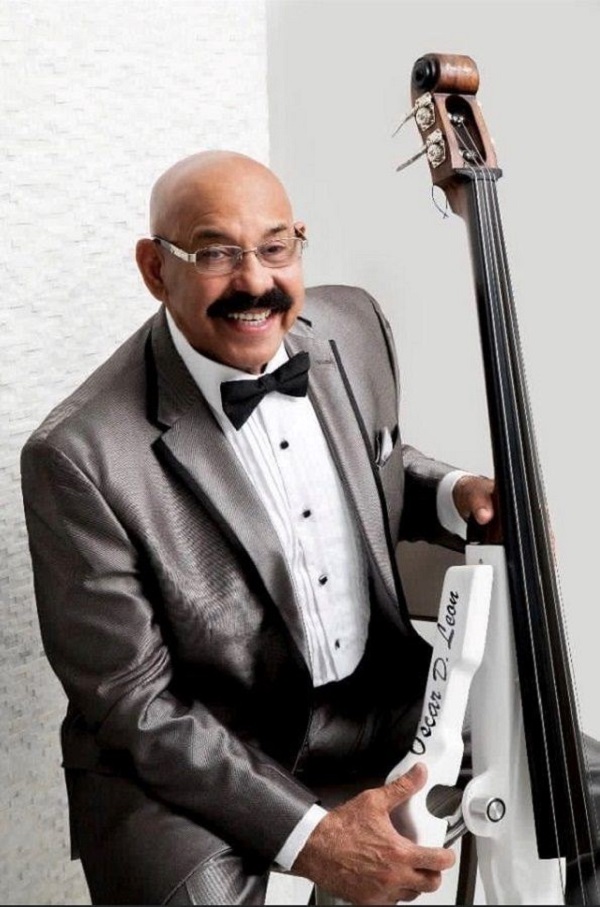Celebrates 150 years of history with a posthumous tribute to Tito Puente, Típica 73 and Ismael Miranda
National Zalsa Day 2023
This year the privilege of conducting the Super Orchestra of the National Zalsa Day 2023 is for Maestro Isidro Infante, March 19 at the Hiram Bithorn Park in San Juan, Puerto Rico.
For many years the most important salsa event in Puerto Rico and internationally. Thanks to Z-93 and the entire SBS family. Mr. Alarcón, Víctor Roque, El Cacique and all the executives involved in such an important event.
We will also have Buho Loco and El Hachero, among others.

The radio station Zeta93FM and its sister company, LaMusica.com, announce the thirty-ninth edition of the National Zalsa Day; an award-winning concert, which, on this occasion, will pay a special tribute to the 50th anniversary of one of the most recognized orchestras in the world, La Típica 73.
Known as the pioneers in performing the famous “Descargas musicales”, Adalberto Santiago, José Alberto “El Canario”, Tito Allen and Johnny “Dandy” Rodríguez, have already confirmed their participation and we are proud that the members of this legendary band, which left such a deep mark on the salsa genre, have decided to join us in this celebration.

On April 20, 2023, the 100th anniversary of the birth of legendary timbalero Tito Puente, his son.
Tito Puente Jr., along with great guest artists such as Orestes Vilato, Nicky Marrero, Endel Dueño, Frankie Figueroa, Frankie Morales, John “Dandy” Rodríguez and José Madera celebrarán playing on stage the greatest hits of the “King of Latin Music”, among which are: “Oye como va”, “Ran Kan Kan” and “Para los Rumberos”.
“Puente’s legacy of more than 50 years, known as ‘The King of the Timbal’, ‘The composer and musician of the eternal smile’ and ‘The godfather of Latin jazz and salsa’, will be exalted in front of more than 20,000 people at DNZ2023 and we are sure that all salseros will enjoy this presentation,” said announcer Marcos Rodríguez “El Cacique”.

In April 2000, the third Sunday of March was instituted as National Zalsa Day under Law #100 of the Senate of Puerto Rico.
History
National Zalsa Day was created in 1984 by Pedro Arroyo, Programming Director of Z-93, who always wanted to celebrate an event that would recognize the talent of popular salsa music, its composers and performers, to present it to the great public who love this tropical genre.
Since its first year, the great event took hold of an audience eager to enjoy this music live.
The support was total and it immediately positioned itself as the annual concert of the people of Puerto Rico and visitors from other countries.
From its beginnings, National Zalsa Day was dedicated to a figure of this genre, as a recognition of his talent and rootedness in the public.
1984 – Dedicated in life to Sonero Mayor, Ismael Rivera
1985 – Rafael Ithier of the Gran Combo de Puerto Rico
1986 – Tito Puente and Santitos Colón
1987 – Héctor Lavoe
1988 – Andy Montañez and Gilberto Santa Rosa
1989 – Celia Cruz and Sonora Ponceña
1990 – Willie Colón and Tite Curet Alonso
1991 – Bobby Valentín, Oscar D’León and composer Gloria González.
1992 – To the Best 5 trumpets of Puerto Rico: Elías Lopés, Charlie Sepúlveda, Juancito Torres, Mario Ortiz and Luis “Perico” Ortiz.
1993 – Celebration of the Tenth Anniversary of National Zalsa Day, dedicated to the Salsa People
1994 – Ray Barreto and Adalberto Santiago
1995 – “Duels at sunset”.
1996 – Dedicated to the reunions: Conjunto Clásico, Tito Nieves, Luis “Perico” Ortiz and Rafael De Jesús, El Gran Combo; Andy Montañez and
Roberto Rohena; Sonora Ponceña with Luigi Texidor and Yolanda Rivera.
1997 – To the salsa people
1998 – Jerry Masucci
1999 – Cheo Feliciano
2000 – Richie Ray and Bobby Cruz
2001 – Eddie Palmieri
2002 – Ruben Blades
2003 – Johnny Pacheco and Roberto Rohena
2004 – Quique Lucca, Papo Lucca and Willie Rosario
2005 – Tommy Olivencia and Roberto Angleró
2006 – Los Hermanos Lebrón and posthumous tribute to Charlie Palmieri, Tito Rodríguez and Ray Barretto
2007 – Ismael Miranda, Ramón Rodríguez, Raphy Leavitt and Sammy Marrero
2008 – Larry Harlow and Manny Oquendo
2009 – Celebration of the release of Tite Curet Alonso’s work on Puerto Rican radio. Dedicated to Louis Garcia.
2010 – Johnny Ortiz. Special recognition to Héctor Maisonave and Ángel Luis Córdova García “Paleco”.
2011 – Elvin Torres of Costa Brava, Luisito Ayala of Puerto Rican Power, Paquito Guzmán, Tito Allen and Luigi Texidor.
2012 – Posthumous tribute to Frankie Ruiz. Dedicated to Orquesta Zodiac and La Corporación Latina.
2013 – Posthumous tribute to Pedro Arroyo, former director of Z-93. Special recognition to Edwin Morales of La Mulenze, Pedro Brul, Pedro Conga of Orquesta Internacional and Cano Estremera.
2014 – El Gran Combo, Joe Rodríguez of La Terrífica, Justo Betancourt and Meñique.
2015 – Gilberto Santa Rosa receives the first National Zalsa Day Star Award. Dedicated to Sammy “Rolo” González, Mickey Cora, Nacho Sanabria.
2016 – Eddie Palmieri receives the second National Zalsa Day Star Award. Dedicated to Lalo Rodríguez and Tito Rojas.
2017 – Zeta 93 announced on the program of its director Néstor Galán, el Buho Loco, that the artists participating in the 34th edition of National Salsa Day are el Gran Combo, José Alberto el Canario, Andy Montañez, la India, Don Perignón y la Puertorriqueña, Grupo Niche, Víctor Manuelle, Luisito Carrión, Guillo Rivera, Camilo Azuquita, Raúl Marrero, Carlos D’ Castro, Juan Pablo Díaz, Orquesta DNZ2017 and Orquesta Canario.
2018 – Dedicated To The People Of Puerto Rico!
Domingo Quiñones, Maelo Ruiz, Chamaco Rivera, Pupy Cantor, Oscar de León, Orquesta Canela (Cali, Colombia), Tribute to Tito Nieves and Yolanda Rivera, La Orquesta del Día Nacional de La Salsa, Pete Pererignon y la Generación del Presente, El Maestro Sammy Velez with Nino Segarra, Héctor Tricoche y Simón Pérez, Víctor García y La Sonora San Juanera and Willie Otero y su Orquesta.
2019 – Los Reencuentros will be
Conjunto Clásico with Tito Nieves, Luis Perico Ortiz with Roberto Lugo, Orquesta Mulenze with Pedro Brull, Don Perignon y la Puertorriqueña with Víctor Manuelle, Frankie Vázquez, Pedro Bermúdez Big Band, Charlie Aponte, Pichie Pérez, Yolanda Rivera, Pedro Arroyo, Conjuno Chaney, Pirulo y la Tribu, Manolito Rodríguez.
2020 – Oscar D’ León, Eddie Palmieri, La India, Tito Rojas, Lalo Rodríguez, La Sonora Ponceña, Ray de la Paz, Ismael Miranda, Tony Vega, Orq. Del Día Nacional (directed by Louis García).
2022 – The gathering was Richie Ray & Bobby Cruz, Víctor Manuelle, Willie Rosario, Bobby Valentín, La Sonora Ponceña, Andy Montañez, Apollo Sound, La Mulenze, from Panama come to Puerto Rico the winners of the contest in which hundreds of salsa orchestras competed, Luis Lugo y La Orquesta 507, the women’s orchestra Son Divas, La Tribu de Abrante and Luis Vázquez,” said Marcos Rodríguez,
Sunday, March 19, 2023 – 9:00am
Hiram Bithorn Stadium, San Juan
On stage:
– – José Alberto “El Canario”
– Adalberto Santiago
– Tito Allen & Johnny el Dandy Rodriguez
– Luis Figueroa
– Pirulo
– India
– Charlie Aponte
– Maelo Ruiz
– Yolanda Rivera
– Luigi Texidor
– Pichie Perez
– Isidoro Infante
– Alex D’ Castro
– Tributes to Tito Puente, Típica 73 and Ismael Miranda
Prices:
Early Bird : $10.00 + ivu & c.s (Limited quantities) SOLD OUT
Presale: $15.00 + ivu & c.s (Limited quantities) SOLD OUT
GENERAL – $20.00 + ivu & c.s
V.I.P. – $75.00 + ivu & c.s. (Includes numbered seat and preferred entrance)
PLATINUM – $225.00 + ivu & c.s. (Includes food, open bar, official t-shirt and preferential entrance)
Information and Tickets: 787-200-7110 or [email protected]
Ticket office open from 2 hours before the start of the event.












